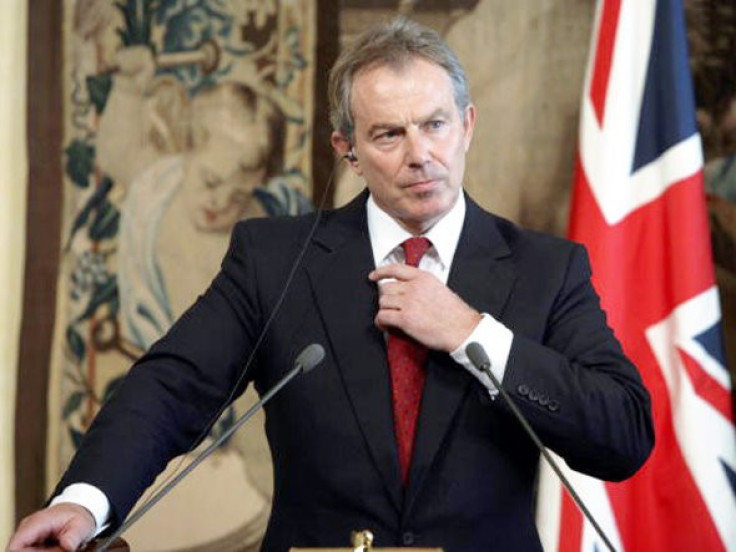Tony Blair, Israel and Palestine: A Chance for Peace or a Chance for Profit?

With the Israeli-Palestinian conflict back on the main international agenda, the role of the UN quartet charged with facilitating peace in the Middle East by the UN and more specifically of Tony Blair has also been put in the spotlight.
A charismatic figure, Blair has remained very influential since leaving office, nominated as part of a UN quartet set up to help bring peace in the Middle-East, setting up his own company called Tony Blair and Associates whose objective is to provide "strategic advice" on "political and economic trends and government reform" and working as a consultant for firms such as JP Morgan.
Throughout the years, Blair seems to have formed close ties with some of the Middle-East leaders, but despite politicians and business people praising the British politician, the Arab press has been less tender towards the former British PM.
Criticisms in Arab newspapers have flourished and all the more so since Blair's effort to prevent the Palestinian statehood bid became apparent.
Blair is the British envoy of the Middle East Quartet, which is a group made up of the United Nations, the U.S., the EU and Russia and is designed to mediate in the peace process between Israelis and Palestinians.
Recently, an Arab newspaper called the Al-Quds reported that the UN Quartet intended to appoint a new peace envoy to the Middle East following a Palestinian request for Blair's dismissal.
While the Palestinian Authority has now denied reports it will make a formal request to remove Tony Blair from his position as envoy for the Middle East Quartet, it did not hide its discontent at what many say is Blair's bias towards Israel.
The Palestinian leadership has for long been suspicious of the former PM and many have accused him of not being an impartial negotiator.
In addition to being criticised for his efforts to lobby European powers to drop their support for the Palestinian UN statehood bid, Palestinian leaders and supporters have also denounced the Quartet's initiative to revive peace talks without mentioning one of the most contentious issues of the conflict: the Israeli settlements in the West Bank.
Palestinian leaders have insisted they will only return to the peace negotiation if Israel stops approving new settlements, and hopes for talks were this week were further dashed after the Israeli government approved a new set of settlement construction.
Blair's duty as the envoy to the quartet is described as being to "boost the West Bank economy and improve Palestinian governance" but since taking the position he has been accused of prioritising Israeli security needs over Palestinian economic needs, an accusation perhaps backed up by Blair saying on Israeli television "when it comes to security, I'm 100 per cent on Israel's side."
Blair has also been accused of officially using his position as a Middle-East peace envoy to lobby for deals that have little to do with the Quartet's mission, and a source from The Telegraph even insisted he used a visit in Libya under the banner of the Quartet to work out deals for JP Morgan.
A documentary also recently broadcasted on Channel 4, The Wonderful World of Tony Blair, has also highlighted an apparent dichotomy between Blair's motives and emphasised an apparent lack of transparency.
Peter Oborne, who presented the documentary, wrote, citing an illustration of the above, "Let's take the example of Mr Blair's visit to the Emir of Kuwait, part of a wider Middle Eastern tour, made on January 26, 2009. He was introduced to the Emir - who is said to feel a profound sense of gratitude to the former British prime minister because of his role in deposing Kuwait's greatest enemy, Saddam Hussein - in his capacity of Quartet Representative. And, indeed, Blair is charged by the Quartet with raising Middle Eastern funds to plough into Palestinian projects. "
According to the reporter, not long after the meeting, the Emir gave Tony Blair Associates a lucrative consultancy deal, which stayed secret for two years, to provide advice on the future of the Kuwaiti economy.
Other details such as Blair pleading for the Israelis to allow a mobile phone company, Wataniya Mobile, to become operational, while the company's owner Qatari telecom QTEL is a major client of JP Morgan for whom Blair works, also lead to confusion between his proclaimed objectives as member of the Quartet and other possible and less explicit motives.
While Blair denies all accusations of wrongdoing, it remains to be seen how he is expected to bring Palestine and Israel closer to peace if Palestinian leaders see him as being biased.
The questions surrounding Blair's position as a Middle East Peace envoy also concern the Quartet as a whole. Despite being created four years ago, in terms of negotiations very few steps have been achieved and peace talks have been at a standstill for a while.
The Quartet it seems is avoiding tackling some of the most crucial issues of the conflict, such as the Israeli settlements, which are in contradiction with international law, and thus project the image of a group which has an almost one-sided view of the conflict.
In order for peace in the Middle-East to come, the status-quo that has prevailed for the last 60 years will have to change and real solutions demanding both camps to make important concessions will be required. In the meantime however, it seems that while the conflict is costing Palestinian and Israeli lives it might also give rise to economic opportunities for those who are the less affected by it.
© Copyright IBTimes 2024. All rights reserved.





